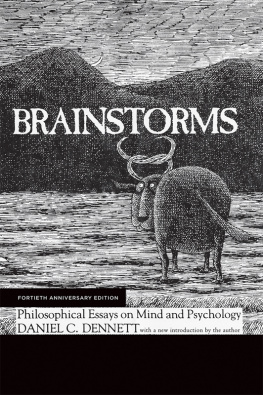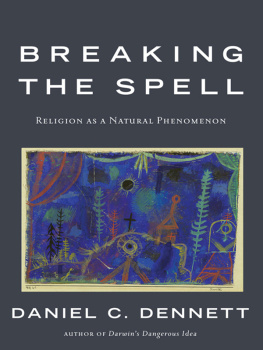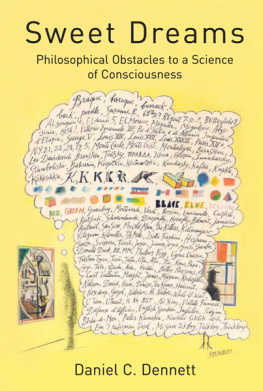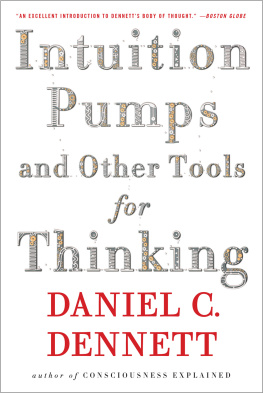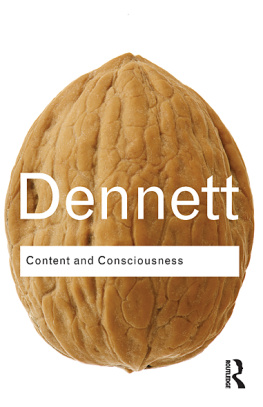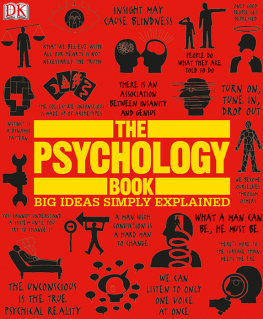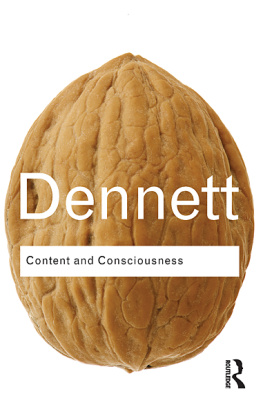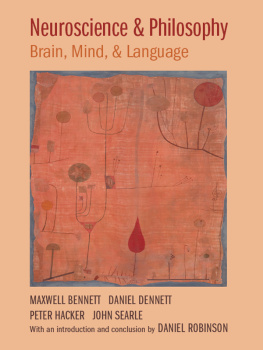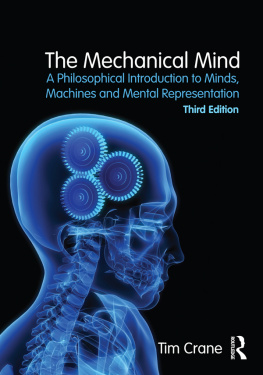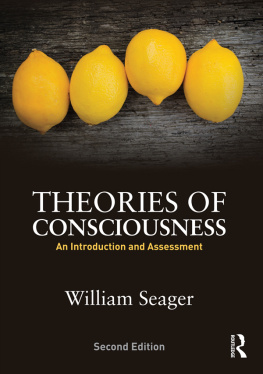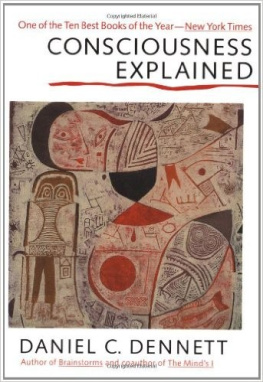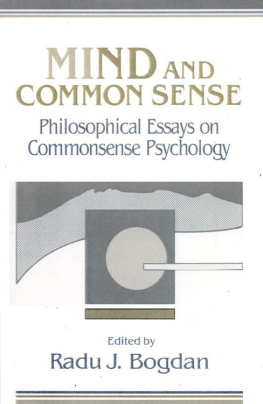

Praise for Daniel C. Dennetts Brainstorms
The problems that Daniel Dennett addresses in his essays are crucial ones for philosophy and contemporary science. With a sure touch and a great deal of insight, he has subjected to analysis questions that lie at, or perhaps just beyond, the frontiers of the scientific study of mind and brain. Dennetts work should help guide progress in the understanding of the profound and troubling issues that have intrigued and perplexed critical minds for many centuries. His work is stimulating and impressive.
Noam Chomsky
Starting with a profound knowledge of general philosophy, including the older work of the ordinary language school, Dennett has developed a very sophisticated version of the functionalist position in the philosophy of minda version which combines philosophical and psychological sophistication in an extraordinary way. The papers the Dennett has published since Content and Consciousness show in particular that Dennett is aware of all of the subtleties of the problems involving such psychological phenomena as pain and mental imagery and that he is capable of integrating psychological information and philosophical discussion in an extremely exciting way. I think that his work in the philosophy of mind is of very great importance.
Hilary Putnam
There is a new coherent field in which cognitive psychologists, neurophysiologists, computer scientists in artificial intelligence, and epistemological philosophers collaborate as equals, carefully studying each others works. The names for the field are not as yet stabilized or equi-centered: naturalistic epistemology, descriptive epistemology, psychological epistemology, cognitive-neuropsychology, brain science, theory of intelligence (expanded from artificial intelligence), etc. Dennett is one of the leading philosophers forming this new area. He has really done his homework on computers, learning theory, central nervous system neurophysiology, and psycholinguistics. Readers in these fields will recognize Dennett as a fellow scientist, as well as a skilled philosopher, as he relates your findings and theories to the traditional epistemological puzzles of intentionality, the mind-body (mind-brain) problem, and free will. Cognitive psychologists interested in integrating their theories with neurophysiology and behavior will find this book exciting and relevant, even if they have not previously indulged an interest in epistemology issues. I enthusiastically recommend Brainstorms to all of us verging on and into this exciting new field!
Donald Campbell
The essays in this volume comprise what is perhaps the most important single, sustained contribution by a philosopher to the current inter-disciplinary conversation about the nature and methodology of the cognitive sciences. This book will surely provide a landmark in what the optimists among us think of as the post-behaviorist period in the philosophy of mind. Informed discussion of explanation in linguistics, cognitive psychology and AI starts here.
Jerry Fodor
These essays are delightful philosophical gems. I have assigned most of them in courses, both graduate and undergraduate, and have found them extraordinarily useful. They make the reader think. Dennetts writinglike that of Putnam and Kripkeis somehow comprehensible and illuminating to students at all levels. The convergence of research in philosophy of mind with work in psychology and artificial intelligence has created a need for teaching material that is sophisticated about all these fields. Dennetts book fills the bill. It is one of those rare books that pushes back the frontiers of knowledge, and at the same time is charming, entertaining, and accessible. For anyone interested in foundational issues in the sciences of the mind, Dennetts book is a must.
Ned Block
Dennetts studies in the philosophy of psychology are gems of conceptual analysis. His expert knowledge of the many disciplines which deal in one way or another with the nature and behavior of intentional systems gives what he has to say a substantive content which distinguishes his dialectic from the usual ballet of shadows. The topics he takes up are of strategic importance in the philosophy of mind. Each essay stands on its own feet, and that is how one would meet them if it were not for this publishing venture. Bound together, they constitute a whole which is truly more than the sum of its parts. They are deftly written and a joy to read.
Wilfrid Sellars
I am delighted to see that Daniel Dennetts essays are being collected into a book. Dennett is one of the few writers who combines philosophical sophistication with a clear insight into the nature of computers and artificial intelligence. He raises issues which are of crucial importance to understanding what researchers in artificial intelligence are really doing, and he does so in a clear common-sensical way. He succeeds at clarifying the problems, rather than entering into the partisan debate which all too often ensues when scientists and philosophers tangle. I look forward to seeing the book and to participating in the discussion which it is bound to provoke.
Terry Winograd
Brainstorms
Philosophical Essays on Mind and Psychology
Fortieth Anniversary Edition
Daniel C. Dennett
A Bradford Book
The MIT Press
Cambridge, Massachusetts
London, England
First MIT Press edition, 1981
1978 Bradford Books, Publishers
Drawings in the front matter and on the cover are by Edward Gorey and are published by arrangement with The Edward Gorey Charitable Trust.
All rights reserved. No part of this book may be reproduced in any form by any electronic or mechanical means (including photocopying, recording, or information storage and retrieval) without permission in writing from the publisher.
This book was set in ITC Stone Sans Std and ITC Stone Serif Std by Toppan Best-set Premedia Limited. Printed and bound in the United States of America.
Library of Congress Cataloging-in-Publication Data
Names: Dennett, D. C. (Daniel Clement), author.
Title: Brainstorms : philosophical essays on mind and psychology / Daniel C. Dennett.
Description: 40th Anniversary Edition. | Cambridge, MA : MIT Press, 2017. | Includes bibliographical references and index.
Identifiers: LCCN 2017009922 | ISBN 9780262534383 (pbk. : alk. paper)
eISBN 9780262343718
Subjects: LCSH: Psychology--Philosophy. | Cognition. | Philosophy.
Classification: LCC BF38 .D46 2017 | DDC 153--dc23 LC record available at https://lccn.loc.gov/2017009922
ePub Version 1.0
for Andrea and Peter
Reflections on Brainstorms after Forty Years
Brainstorms was published in 1978, the same year that the Alfred P. Sloan Foundation inaugurated its generous program of support for cognitive science, setting off something of a gold rush among researchers in many fields who thought they could see their own favored projects as cognitive science of one kind or another. Sloan-sponsored conferences and workshops were held around the country, and soon there emerged a cadre of speakers drawn from the various component disciplines who could be counted on to present perspectives on their own discipline that were accessible to outsiders, provocative, and in many cases actually useful across disciplinary boundaries. The Sloan Rangers, we were dubbed, and I was one of the most junior members of the roving band, since few philosophers of the generation who had been my teachers were interested in getting out of their armchairs. (The work of a few of those philosophers was influential: Austins work on performatives and Grices work on implicatures in particular.) The philosophical corner of the interdisciplinary pentagon (along with psychology, linguistics, computer science, and neuroscience) was anchored by Jerry Fodor, Gil Harman, Bert Dreyfus, John Searle, and me, with the Churchlands soon to invade from the north. The other corners were occupied by psychologists such as George Miller, Roger Shepard, Anne Treisman, Ulric Dick Neisser, Zenon Pylyshyn, and Philip Johnson-Laird; linguists Noam Chomsky, Ray Jackendoff, Jim McCawley, Barbara Partee, and George Lakoff; computer scientists Allen Newell, Herbert Simon, Marvin Minsky, John McCarthy, Roger Schank, and Terry Winograd; and neuroscientists Michael Gazzaniga, Brenda Milner, Marcus Raichle, and Michael Posner.
Next page
